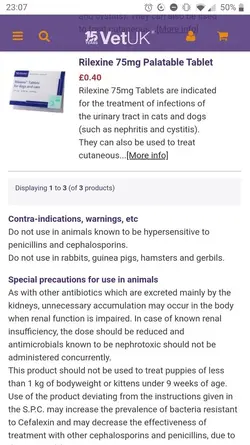My Guinea pig Rosie has been struggling with a uti since May. Since then she has had 4 lots of baytril and metacam. For the last two courses she was on them for over 30 days, the last course finished on 24th October. I then took a urine sample for the vets to check. The results came back and the vets said that there was still blood in her urine (I don't know if there was any bacteria still in her wee, I was going to call tomorrow to ask) the vet said that as there was still blood then the baytril hadn't worked and it probably wouldn't so he has prescribed Rilexine. I haven't given it to Rosie as it is penicillin and from what I've read it should never be given to a Guinea pig. The last thread on here that mentions Rilexine is from 2010 and I just wondered if anyone had any thoughts on whether it is safe? Or if they have an experience of using it with their piggy. The vet I spoke to isn't the normal piggie savvy vet I usually speak to, she's away on holiday. If Rilexine is a big no no, can you suggest an alternative uti treatment that I can suggest to the vet? Rosie isn't weeing blood but she squeaks sometimes when she wees and poos.
Thank you in advance for any help or advice you can give.
Hi
If a UTI is not reacting to antibiotics or keeps flaring up and any other problems with the urinary tract have been expluded, then Rosie is most likely having sterile (i.e. non-bacterial) interstitial (i.e. recurring) cystitis (bladder infection). Sterile IC has become a lot more common in guinea pigs over the last decade but is not much known outside vet circles that see a lot of guinea pigs.
It seems to mostly affect the natural glucosamine coating of the walls in the urinary tract, which prevents the very corrosive urine from coming into direct contact with raw tissue. Because of its nature (cannot be healed by antibiotics, which are designed to work on bacteria), sterile IC cannot be healed and only managed until in milder cases it will go away on its own eventually some years down the line.
Key is glucosamine (which is classed as a food supplement and not as a medication) to replenish the natural coat and metacam for the inflammation and pain in the tissue. Of the two, glucosamine is the more important. it will however take a while to built up, so don't expect quick effects. You will need to have to learn how much glucosamine your piggy needs for maintenance in between flares and how much you need to up the medication dosage to get on top of an acute flare-up ideally within a few days. Treatment follows roughly that of feline sterile cystitis (FSC) in cats, which may be better known to a vet who has never heard of it in guinea pigs.
Mild to medium cases can usually be managed with oral glucosamine, like feliway cat cystease capsules (recommended for ease with dosage as you can mix the powder with 2 ml of water and then give once daily or 1 ml of it twice daily). Many but the very worst cases can now be helped with cartrofen (a high glucosamine medication that is used for arthritis, as fairly recent research has shown).
Here is a bit more information (including on diet recommendations, see chapter special diets):
Long Term Balanced General And Special Needs Guinea Pig Diets
Links - Interstitial Cystitis - Guinea Lynx Records
Please do not give that antibiotic to any guinea pig; especially if it comes with a specific warning to not prescribe it for guinea pigs. Penicillin can be fatal for rodents like guinea pigs. Please notify the clinic.
If you would like to see another vet, here is our list of recommended vets:
Recommended Guinea Pig Vets
All the best.
